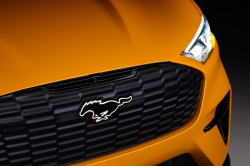
— A Ford Mustang Mach-E lawsuit is hanging on in court, but not by much after the judge dismissed all the claims except three state law claims.
The Ford Mustang Mach-E class action lawsuit was filed shortly after Ford recalled about 49,000 Mustang Mach-E SUVs. The June 2022 recall involved 2021-2022 Ford Mustang Mach-E SUVs.
Nine plaintiffs from seven states claim the recall failed, and the Ford vehicles allegedly create an “unreasonable risk of accident, injury, death, or property damage if their vehicle completely or partially loses power while in operation.”
According to Ford, direct current (DC) fast charging and repeated wide open accelerator pedal events can cause the high-voltage battery main contactors to overheat.
This can cause an electric relay switch to remain open or cause a relay switch to weld closed from heat. The Mustang Mach-E may shut down due to a weak high-voltage battery main contactor.
Between July 13, 2021, and May 31, 2022, more than 280 warranty claims were made in the U.S.
Ford investigated the problem and in conjunction with the National Highway Traffic Safety Administration, a Ford Mustang Mach-E recall was issued in June 2022.
Ford said it could prevent the contactors from overheating by updating the secondary onboard diagnostic control modules and battery energy control modules.
Ford also provided a reimbursement program for any out-of-pocket expenses.
According to the Mustang Mach-E lawsuit, four of the plaintiffs contend their Ford vehicles had problems, but none of the plaintiffs allege any physical injuries. In addition, none of the plaintiffs allege any property damage.
Motion to Dismiss the Ford Mustang Mach-E Lawsuit
Ford argues the entire lawsuit should be dismissed because the vehicles had already been recalled when the lawsuit was filed. Based on the "prudential mootness doctrine," Ford says the plaintiffs have no case as Ford's recall is approved and overseen by NHTSA.
The judge found courts are "clear about the parameters of the prudential mootness doctrine related to automobile defects subject to a recall."
“By filing documents with NHTSA notifying it of a defect, [Ford] set into motion the great grinding gears of a statutorily mandated and administratively overseen national recall process.”
However, the judge disagreed with Ford because the plaintiffs claim the software update is not a “bona fide fix.”
According to the judge, a determination as to whether Ford’s recall remedy fixed the problems is a determination that should be left to a jury.
Ford had better success regarding nationwide claims of violations of the Magnuson-Moss Warranty Act, fraudulent concealment and unjust enrichment. The judge found the plaintiffs lacked standing to allege viable warranty, fraudulent concealment and unjust enrichment claims under the laws of all fifty states.
All three of those claims were dismissed, leaving only state law claims for certain customers.
The Ford Mustang Mach-E lawsuit alleges plaintiffs from California, Georgia and Maine own vehicles that suffered problems, allegedly making those Mustang Mach-E SUVs unsafe to drive.
"These instances demonstrate viable arguments that the vehicles did not provide a safe or reliable means of transportation, and therefore cannot be considered fit for their ordinary use, or merchantable." — Judge Linda V. Parker
But plaintiffs from Pennsylvania, Indiana, Nevada and North Carolina, "do not allege sufficient facts on the face of the Amended Complaint to show that their vehicles were not reasonably safe for them to operate."
Those plaintiffs "failed to state a claim for a breach of the implied warranty of merchantability."
The Ford Mustang Mach-E lawsuit survives only on these three claims:
- California – The Song–Beverly Consumer Warranty Act claim.
- Georgia – The implied warranty of merchantability claim.
- Maine – The implied warranty of merchantability claim.
The Ford Mustang Mach-E lawsuit was filed in the U.S. District Court for the Eastern District of Michigan: Amber Sulligan v. Ford Motor Company.
The plaintiff is represented by Hagens Berman Sobol Shapiro LLP, and The Miller Law Firm PC.




